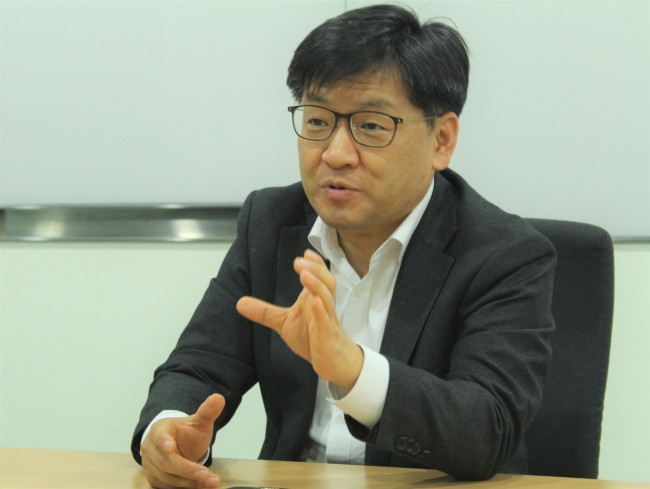[Non-memory Korea: 6] Nvidia’s ‘intellectual honesty’ culture offers lessons for Korean fabless firms: exec
Leading fabless chipmaker says government needs to ensure domestic firms benefit for their R&D achievements, while companies try to create a culture of failures
By Song Su-hyunPublished : May 9, 2019 - 17:51
What has made Nvidia a strong player in the non-memory chip market today is the firm’s corporate culture to promote “intellectual honesty,” said Cha Jung-hoon, Nvidia Korea head of enterprise sales and marketing.
Cha is currently in charge of the American company’s automotive and embedded businesses in South Korea, after serving at several domestic fabless firms.
“Nvidia has been doing what it has wanted to do for the past 26 years,” he said during an interview with The Korea Herald.
“The company has been working on accelerating the speed of processing data focusing on the fact that the amount of data to be processed all at once increases immensely.”
Cha introduced intellectual honesty as the core of the $9.7 billion worth Santa Clara-based fabless business’ workplace culture since 1993, which has encouraged its engineers to share goals, be frank with their failed attempts, discuss the cause of failures and fix the problems.
Cha is currently in charge of the American company’s automotive and embedded businesses in South Korea, after serving at several domestic fabless firms.
“Nvidia has been doing what it has wanted to do for the past 26 years,” he said during an interview with The Korea Herald.
“The company has been working on accelerating the speed of processing data focusing on the fact that the amount of data to be processed all at once increases immensely.”
Cha introduced intellectual honesty as the core of the $9.7 billion worth Santa Clara-based fabless business’ workplace culture since 1993, which has encouraged its engineers to share goals, be frank with their failed attempts, discuss the cause of failures and fix the problems.

Such efforts over the past two decades have elevated the status of Nvidia’s flagship graphics processing units -- previously mainly for gaming -- to one of the most crucial parts of artificial intelligence-based autonomous driving.
While Intel’s central processing unit is nicknamed as the brain of computer, Nvidia’s GPU is called the “eye” of AI-based applications such as self-driving vehicles.
“The company has created the idea of parallel computing -- which is an improvement over the serial computing platform generally used in operating systems of ordinary computers -- finding that the new method of using matrixes is more suitable for processing countless amounts of data on GPUs,” Cha said.
“Parallel computing was previously used for gaming, but today, we are seeing an increasing number of new applications that require utilization of GPUs, such as AI and autonomous driving,” he said.
Nvidia never forecast that its GPUs would be part of the new era of AI and autonomous driving, Cha said. The company has been solely concentrating on the acceleration of GPU performance, and is lucky to have been able to provide high-performance GPUs in a timely manner.
“In the non-memory market, first aid medicine never works effectively,” he said. “Companies need to make their fundamentals strong by digesting healthy things over a long period of time.”
Regarding Korea’s move to nurture the non-memory chip industry, Cha advised the government to ensure effective benefits for industry players, and domestic fabless companies to choose a domain in which they have some specific knowledge.
“It’s not correct to say Korea has no capabilities in the non-memory sector, but it’s more correct to say the country had not paid attention to the market,” Cha said. “The government needs to offer non-memory companies plenty of benefits that will help promote their R&D activities, which will give them a sense of calling for their jobs.”
He stressed it is all the more important to create a culture that accepts failures across the industry, criticizing Korea’s corporate culture that is less tolerant with failures and makes outstanding talent shun their own country.
“In the years to come, we are going to deal with AI, and it is all about the game of probabilities, which means more attempts increase the chance of winning,” he said. “Engineers should continue trying even after every failure.”
By Song Su-hyun (song@heradlcorp.com)








![[Graphic News] More Koreans say they plan long-distance trips this year](http://res.heraldm.com/phpwas/restmb_idxmake.php?idx=644&simg=/content/image/2024/04/17/20240417050828_0.gif&u=)
![[KH Explains] Hyundai's full hybrid edge to pay off amid slow transition to pure EVs](http://res.heraldm.com/phpwas/restmb_idxmake.php?idx=644&simg=/content/image/2024/04/18/20240418050645_0.jpg&u=20240419100350)





![[From the Scene] Monks, Buddhists hail return of remains of Buddhas](http://res.heraldm.com/phpwas/restmb_idxmake.php?idx=652&simg=/content/image/2024/04/19/20240419050617_0.jpg&u=20240419175937)

![[KH Explains] Hyundai's full hybrid edge to pay off amid slow transition to pure EVs](http://res.heraldm.com/phpwas/restmb_idxmake.php?idx=652&simg=/content/image/2024/04/18/20240418050645_0.jpg&u=20240419100350)

![[Today’s K-pop] Illit drops debut single remix](http://res.heraldm.com/phpwas/restmb_idxmake.php?idx=642&simg=/content/image/2024/04/19/20240419050612_0.jpg&u=)